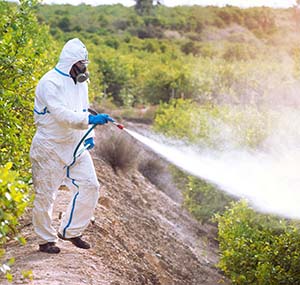- Candidates
- Login
- Set Up Account
- Create a Job Alert
- Search Tools
- Resources
- Employers
Overview
A pesticide technician takes steps to control pests on fields, landscaping, commercial buildings and personal residences. They are ultimately responsible for working with customers to identify the pest causing a problem, create a plan to exterminate the pest and apply the appropriate pesticides (a substance intended for preventing, removing, or destroying pests such as insects or rodents). There is also opportunity for this role to be specialized in certain areas such as rodent control, termite control, general pest control, fumigation (applying pesticides in a gaseous state) or working with ornamental and turf (landscaping) pesticides.

What responsibilities will I have?
What education and training is required?
A high school diploma or equivalent is required. Pesticide technicians are also required to have a license from the federal government (United States Environmental Protection Agency) and from the state that they will be working in. The licensure process includes classroom education, hands-on training and supervised work experience. Regular continuing education courses must be completed to keep all licenses up to date. Pesticide technicians must also keep a valid driver’s license.
To pursue a career as a Pesticide Technician:
The following high school courses are recommended: agricultural education, plant science, agricultural mechanics, chemistry, biology and personal finance.
Where can I work?
Employers may include chemical companies, commercial and residential pest control companies, and facilities such as golf courses. There is also the opportunity for self-employment.
Future Job Market / Outlook
Good
Suggested Professional Organizations and Associations